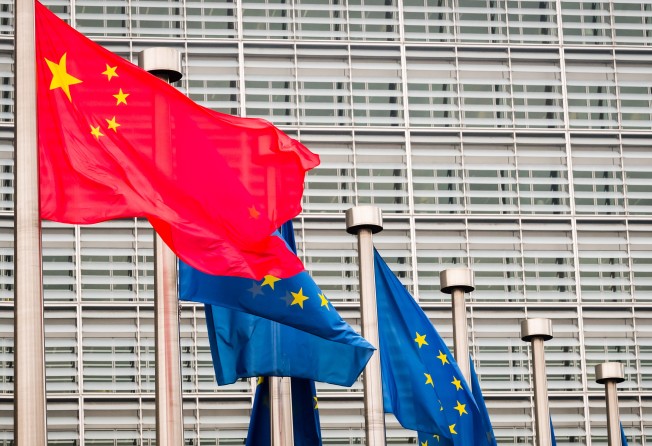EU leaders expected to raise Hong Kong in virtual summit with Chinese President Xi Jinping
- Coronavirus pandemic puts paid to face-to-face meetings and rapport building as annual summit convenes by phone
- Joint statement unlikely this year with European Union determination to raise its concerns with Chinese leadership

European Union leaders are expected to put direct pressure on Chinese President Xi Jinping over the issue of Hong Kong on Monday, with a frosty EU-China “virtual” summit unlikely to yield any joint statement this year.
It will be the first encounter between the Chinese leader and Ursula von der Leyen, who was chosen as European Commission president in December with a pledge to build a geopolitical union. They will spend an hour on the phone, just days before Beijing is expected to move forward with the controversial national security law for Hong Kong. Joining them on the call will be European Council President Charles Michel.
“We are trying to exercise influence in expressing our concerns by reaching out actively over the last few days and weeks – and this will be the highest-ranking reaching out on Monday, to our partners in Beijing,” an EU source said.
Another EU source added: “The issue of Hong Kong needs to be addressed as this affects our ability to further develop our relations between the EU and China.”
The conversation with Xi will follow another one, earlier on Monday, with Premier Li Keqiang, in which the EU leaders are expected to focus on the progress of an investment treaty between the European trading bloc and China. Underscoring the lack of progress on the negotiations, EU sources said there would be no joint communique between the two sides this year.
The Covid-19 pandemic disrupted the original plan for von der Leyen and Michel to travel to Beijing and build a personal rapport with their Chinese counterparts. Instead, there will be no face-to-face meetings or opportunities to sit down together and socialise over meals.
The EU leaders are also aware of the sensitive timing of the EU-China summit, after the National People’s Congress – China’s top legislature – announced plans to move forward with the national security law within a week. “Once it is clear what actually this law includes and how it would be implemented, then we have to look at all options,” one of the sources said.
The other source pointed out there was “support across the board” within the 27-member bloc for its position that the law would damage Hong Kong’s high degree of autonomy. The EU joined the Group of Seven nations last week to issue a strongly worded statement calling on Beijing to reconsider the law that it hopes will help curb alleged foreign interference and secessionist movements in the city.
According to the sources, Von der Leyen and Michel will discuss Hong Kong under the broad topic of human rights, which also includes Uygur Muslims in China’s northwestern region of Xinjiang.
“Hong Kong [involves] a special obligation,” one of the sources said. “Whatever will be enacted in Hong Kong needs to be in fulfilment of the Sino-British Joint Declaration, or Basic Law, but also the rights and obligations under the International Covenant on Civil and Political Rights.”
Last year’s EU-China summit resulted in a joint communique which stipulated the two sides would aim to clinch a deal on fairer investment opportunities for European companies operating in China. This year, however, is not going to see a similar agreement, raising questions over whether the deal could be in place by the self-imposed deadline of December.
One EU source outlined three outstanding sticking points in the ongoing negotiations: the lack of market access, especially for financial services; the lack of a level playing field, especially in light of China’s preferential treatment for state-owned enterprises; and sustainability and the environment.
Last week, Germany’s top envoy to the European Union Michael Clauss warned China that the bloc’s biggest economy was not prepared to accept a half-baked treaty, saying: “A bad deal is not an option.”
Clauss told the South China Morning Post that the progress of talks over the deal to protect European investors in China was “quite limited”, adding: “We are definitely not there yet. We currently don’t have the dynamic that would be necessary in order to clinch a deal.”